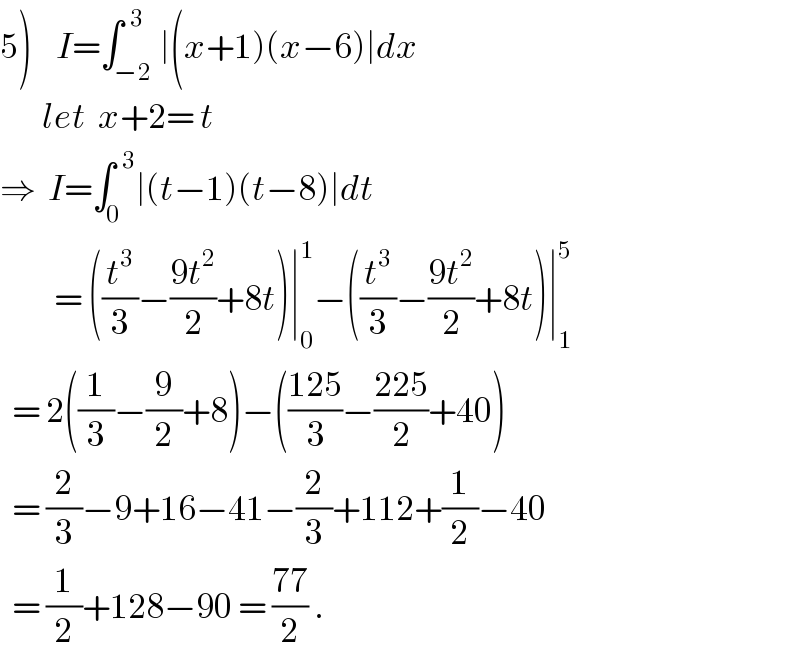
Question and Answers Forum
Question Number 52619 by tanmay.chaudhury50@gmail.com last updated on 10/Jan/19
![1)∫_1 ^3 (dx/(x^2 +[x]^2 +1−2x[x])) 2)∫_(−1) ^1 [x[1+sinπx]+1]dx 3)∫_0 ^2 x^([x^2 +1]) dx 4)∫_0 ^1 e^(2x−[2x]) d(x−[x]) 5)∫_(−2) ^3 ∣x^2 −5x−6∣dx from question 1 to 4 [.]←greatest integer fuction ∣.∣←mod questions taken from B.Stat entrance exam...](Q52619.png)
Commented by maxmathsup by imad last updated on 10/Jan/19
![1) let I =∫_1 ^3 (dx/(x^2 +[x]^2 +1−2x[x])) ⇒ I =∫_1 ^3 (dx/((x−[x])^2 +1)) =∫_1 ^2 (dx/((x−1)^2 +1))+ ∫_2 ^3 (dx/((x−2)^2 +1)) but ∫_1 ^2 (dx/((x−1)^2 +1)) =_(x−1=t ) ∫_0 ^1 (dt/(t^2 +1)) =[arctan(t)]_0 ^1 =(π/4) ∫_2 ^3 (dx/((x−2)^2 +1)) =_(x−2=t) ∫_0 ^1 (dt/(t^2 +1)) =(π/4) ⇒ I =(π/2) .](Q52624.png)
Commented by maxmathsup by imad last updated on 10/Jan/19
![2) let A=∫_(−1) ^1 [x[1+sin(πx)]+1]dx ⇒ A =∫_(−1) ^1 [x +x[sin(πx)]+1]dx=∫_(−1) ^1 [x+1 +x[sin(πx)]]dx =_(x+1 =t) ∫_0 ^2 [t +(t−1)[−sin(πt)] dt =∫_0 ^1 [t+(t−1)[−sin(πt)]]dt +∫_1 ^2 [t+(t−1)[−sin(πt)]dt but ∫_0 ^1 [t+(t−1)[−sin(πt)]]dt=∫_0 ^(1/2) [t+(t−1)(0)]dt+∫_(1/2) ^1 [t+(t−1)(0)]dt =∫_0 ^(1/2) [t]dt +∫_(1/2) ^1 [t]dt =0 +0 =0 ∫_1 ^2 [t+(t−1)[−sin(πt)]]dt = ∫_1 ^(3/2) [t +(t−1)(−1)]dt +∫_(3/2) ^2 [t +(t−1)(−1)]dt =∫_1 ^(3/2) [1]dt +∫_(3/2) ^2 [1] dt =(3/2) −1 +2−(3/2) =1 ⇒ A =1 +(perhaps)^2 ....](Q52625.png)
Commented by tanmay.chaudhury50@gmail.com last updated on 10/Jan/19

Commented by Abdo msup. last updated on 10/Jan/19
![4) changement 2x=t give ∫_0 ^1 e^(2x−[2x]) d(x−[x])=∫_0 ^2 e^(t−[t]) d((t/2) −[(t/2)]) =∫_0 ^1 e^(t−[t]) d((t/2) −[(t/2)])+∫_1 ^2 e^(t−[t]) d((t/2)−[(t/2)]) =∫_0 ^1 e^t (dt/2) +∫_1 ^2 e^(t−1) (dt/2) =(1/2)[e^t ]_0 ^1 +(1/(2e))[e^t ]_1 ^2 =(1/2)(e−1) +(1/(2e))(e^2 −1) .](Q52647.png)
Answered by tanmay.chaudhury50@gmail.com last updated on 10/Jan/19
![3)∫_0 ^2 x^([x^2 +1]) dx ∫_0 ^1 xdx+∫_1 ^(√2) x^2 dx+∫_(√2) ^(√3) x^3 dx+∫_(√3) ^2 x^4 dx now it can be solved...attaching graph for clarity..](Q52633.png)
Commented by tanmay.chaudhury50@gmail.com last updated on 10/Jan/19

Commented by tanmay.chaudhury50@gmail.com last updated on 10/Jan/19
![for 1>x≥0 [x^2 +1]=1 (√2) >x≥1 [x^2 +1]=2 (√3) >x≥(√2) [x^2 +1]=3 2>x≥(√3) [x^2 +1]=4](Q52637.png)
Answered by ajfour last updated on 10/Jan/19

Commented by tanmay.chaudhury50@gmail.com last updated on 10/Jan/19

Answered by tanmay.chaudhury50@gmail.com last updated on 10/Jan/19
![4)∫_0 ^1 e^(2x−[2x]) d(x−[x]) [2x]=0 (1/2)>x≥0 [x]=0 (1/2)>x≥0 [2x]= 1 1>x≥(1/2) [x]=0 ∫_0 ^(1/2) e^(2x−0) d(x−0)+∫_(1/2) ^1 e^(2x−1) d(x−0) =∫_0 ^(1/2) e^(2x) dx+∫_(1/2) ^1 e^(2x−1) dx now can be solved...](Q52638.png)
Commented by tanmay.chaudhury50@gmail.com last updated on 10/Jan/19

Commented by tanmay.chaudhury50@gmail.com last updated on 10/Jan/19

